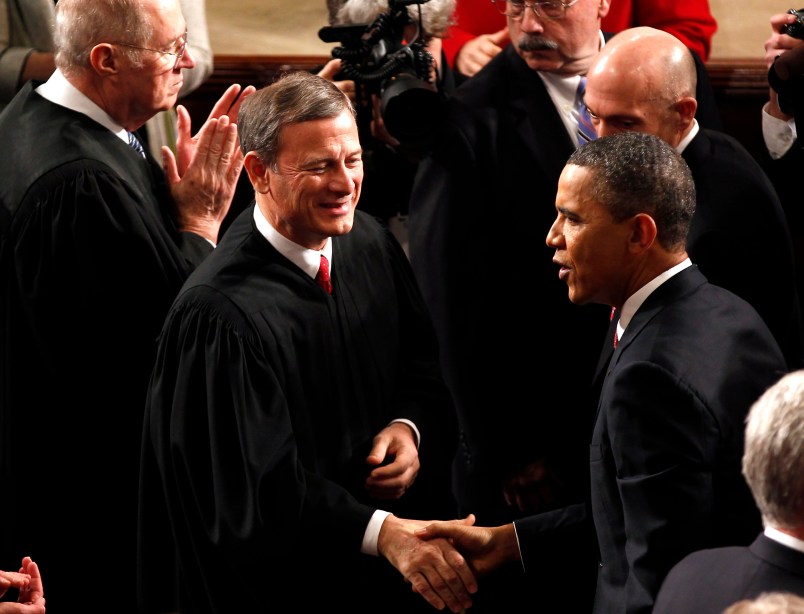The Supreme Court made it official Tuesday: it will have the final say on whether Obamacare’s birth control mandate is constitutional. And progressives are worried.
The two cases it announced it will hear are about the health care law’s requirement that employer-provided insurance plans cover contraceptives for women without co-pays. They have potentially far-reaching legal and political implications, and are set to be heard next spring with a decision expected by the end of June 2014, during mid-term election season.
As expected, the Court agreed to take up a case brought by Hobby Lobby, an Oklahoma-based for-profit retail chain with devout Christian owners who argue that the Obamacare requirement violates their religious freedom. The organization objects to covering contraceptives Plan B, Ella and two kinds of intrauterine devices (IUDs), all of which are designed to prevent pregnancy. Hobby Lobby won the case at the 10th Circuit Court of Appeals.
The Supreme Court also agreed to hear a case brought by Conestoga Wood Specialties Corp. on the same question. The 3rd Circuit Court of Appeals ruled against the organization, saying for-profit businesses may not challenge the mandate on religious grounds.
The conservative tilt of the Supreme Court has progressives and proponents of the mandate worried. Four justices voted last year to wipe out Obamacare in its entirety and the swing justice decided to strike down parts of it.
“The president should be very concerned about the Supreme Court ruling in this case. There is a strong likelihood that this court will say the contraception mandate violates religious freedom,” said Adam Winkler, a liberal law professor at UCLA. “If the court strikes down the contraception mandate, the implications could be broad. It could give businesses the right to seek exemptions from any number of generally applicable laws, including laws protecting against discrimination on the basis of sexual orientation.”
“It is a huge concern for every American, not just progressives,” said Caroline Fredrickson, the president of the left-leaning American Constitution Society. “The corporation is understood to be a separate legal entity from the people who own it. It’s always been understood as such. If the Court concludes that Hobby Lobby is merely an extension of its owners and has the same religious liberty rights they do, then there is arguably no limit to a for-profit business owner’s power to flout any law he or she finds religiously objectionable.”
The legal basis for the challenge is a 1993 law called the Religious Freedom Restoration Act. It was passed to minimize the impact of a 1990 Supreme Court ruling that religious beliefs are not sufficient basis for an exemption from the law. RFRA requires laws that burden religious liberty to have a compelling government interest and be narrowly tailored to meet that interest.
Liberal legal advocates say a ruling against the mandate may expand corporate personhood.
“No court, prior to the handful of courts that have accepted the corporate challenges to the ACA’s contraception mandate, has ever ruled that a secular, for-profit business is protected by the First Amendment’s guarantee of religious free exercise,” said Elizabeth Wydra, chief counsel of the Constitutional Accountability Center. “If the Supreme Court were to hold in this case that commercial enterprise could claim a right to the free exercise of religion, it would mark a sea change in free exercise jurisprudence and take the corporate personhood concept we saw expressed in Citizens United to a ridiculous extreme.”
“The case is unlikely to be decided on the controversial grounds that corporations have religious rights under the First Amendment,” Winkler said. “There’s a much greater likelihood that the court will say the corporations are persons under the religious freedom restoration act.”
The Obama administration tweaked the birth control requirement after it initially caused an uproar early last year. Religious nonprofits like hospitals and universities may opt out of paying for it and pass the cost on to their insurance provider. Churches are exempt entirely. The final rule took effect for most plans on Oct. 1, 2013.
Ed Whelan, a conservative legal analyst, accused the Obama administration of taking a “radical position” against religious liberty and was hopeful that the justices would overturn the birth control requirement. “Let’s hope that the Supreme Court once again repudiates the Obama administration’s extreme hostility to religious liberty,” he said in an email.
The cases are Hobby Lobby Stores, Inc v. Sebelius and Conestoga Wood Specialties Corp. v. Sebelius.






